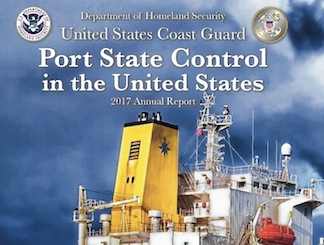The following is text from the U.S. Coast Guard's 2017 Port State Control (PSC) annual report on the enforcement of SOLAS, MARPOL, ISPS Code and other international conventions on foreign vessels trading in U.S. ports.:
(WASHINGTON) — In 2017, we conducted 9,105 SOLAS safety exams with a total of 91 detentions and six ISPS control actions. The annual detention rate of 0.99 percent is our lowest ever. While the three-year rolling average detention ratio dropped slightly for the second year in a row from 1.58 percent to 1.40 percent, we have also seen a rise in the number of detentions related to firefighting and fire protection systems for the fourth straight year. Similarly, MARPOL Annex I deficiencies, which had been on the decline over the past several years, rose slightly in 2017. These serious safety deficiencies suggest problems with these vessels’ safety management systems.
Compliance with international conventions and the safety of shipping has increased dramatically in the last two decades. However, new environmental regulations, increasing complexity in vessel systems and increasing threats in the cyber-realm require vessel owners and operators to maintain robust and effective safety management systems. Coast Guard port state control officers will continue to focus on safety management systems when discovering critical system failures.
Ballast water management (BWM) is another new focus that must be incorporated into each vessel’s SMS. The Coast Guard issued 219 deficiencies for ballast water management compliance problems, almost doubling the number from 2016. To date, we have approved six ballast water treatment systems with several more under review. With availability of multiple options, we are increasing emphasis on BWM compliance and limiting extensions. This past Nov.1, we published a five-part ballast water series in the Coast Guard’s Maritime Commons Blog (http://mariners.coastguard.dodlive.mil/) and more recently provided additional guidance in Navigation and Vessel Inspection Circular (NVIC) 01-18 (http://www.dco.uscg.mil/Our-Organization/NVIC/). These documents provide a comprehensive update on the U.S. ballast water management program and clarify U.S. regulations and enforcement policy. The Coast Guard will continue to be fair and reasonable as these systems are put in service, but vessels must comply with U.S. ballast water management regulations. Noncompliance could lead to significant vessel delays and penalties.
Last year we introduced the QUALSHIP 21 E-Zero program recognizing those exemplary vessels that have consistently adhered to environmental compliance. At the initial rollout in July 2017, 23 received the inaugural E-Zero designations. Within six months, the program has doubled. Congratulations to those vessel operators that have successfully distinguished themselves with this recognition.
Vessel arrivals increased and examinations decreased; detentions decreased
In 2017, a total of 10,190 individual vessels, from 84 different flag administrations, made 83,566 port calls to the United States. The Coast Guard conducted 9,105 SOLAS safety exams and 8,793 ISPS exams on these vessels. These exam numbers decreased slightly from the 2016 totals of 9,390 SOLAS and 8,823 ISPS. The total number of ships detained in 2017 for environmental protection and safety related deficiencies decreased from 98 to 91 with the total number of ships detained in 2017 for security-related deficiencies decreasing from 8 to 6.
Flag administration safety and security performance
Flag administration safety performance for 2017 increased, with the overall annual detention rate dropping from 1.05 percent to 0.99 percent. The three-year rolling detention ratio also decreased from 1.58 percent to 1.40 percent. The flag administrations of Belize, Samoa, and Taiwan were removed from our Targeted Flag List for 2017. Flag administration security performance for 2017 increased ever so slightly as well, with the annual control action ratio (CAR) decreasing from 0.09 percent to 0.06 percent. The three-year rolling average CAR has remained nearly steady dropping from 0.11 percent to 0.10 percent. Additionally, there are no flag administrations listed on our ISPS/MTSA targeted matrix.
Detention appeals
In addition to receiving appeals contesting the overall merits of a detention, we also receive appeals requesting the removal of a party’s association to a detention. In 2017, the Coast Guard received a total of 21 detention appeals. Eleven appeals were submitted challenging the overall merits of the detention. At the time of publication of this report, three appeals were granted and eight were denied. For those parties appealing their association with a detention, 10 total were received. Of those 10, two were denied and eight were granted.
QUALSHIP 21 and E-Zero programs
The QUALSHIP 21 (QS21) program ended calendar year 2017 with an enrollment of 2,013 vessels. For 2016 we had only one flag administration lose its QS21 eligibility over the previous year. Even with the slight drop in detentions in 2017, four flag administrations lost their eligibility while two additional flags became eligible. We would like to welcome the flag administrations of France and the Netherlands for becoming QS21 eligible this year.
Revisions to last year’s report
The Coast Guard makes every effort to report its PSC exam data correctly and in a timely fashion. However, occasionally there may be detention appeals that were not fully adjudicated prior to the publication of the annual report. Following the publication of the 2016 annual report, there were five detention appeals to granted to the flag administrations of Greece (2), Marshall Islands (2), and Panama (1). The three-year detention ratios for those individual flag administrations as well as the overall number of detentions and associated detention ratios have been revised accordingly for this 2017 report.
Click here to view the complete 2017 annual report.

